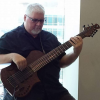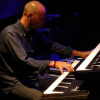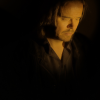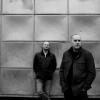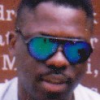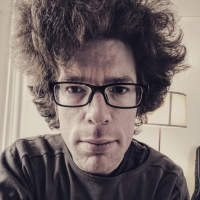Home » Jazz Musicians » King Crimson
King Crimson
"King Crimson is, as always, more a way of doing things. When there is nothing to be done, nothing is done: Crimson disappears. When there is music to be played, Crimson reappears. If all of life were this simple". Robert Fripp
King Crimson was conceived in November 1968 and born on January 13th 1969 in the Fulham Palace Cafe, London (Fripp/Ian McDonald/Greg Lake/Michael Giles/Pete Sinfield), coming to prominence after supporting The Rolling Stones at Hyde Park. Their ground-breaking debut In The Court Of The Crimson King (1969) described by Pete Townshend as "an uncanny masterpiece", began a career that has spanned four decades and influenced many bands and individuals including Yes, Genesis, Tool, and Porcupine Tree.
Despite the original line-up imploding after an American tour King Crimson continued to produce constantly challenging and intriguing music on albums such as In The Wake of Poseidon (1970), Lizard (1970), Islands (1971), Earthbound (1972), Larks' Tongues in Aspic (1973) and Red (1974).
Following Red, an exhausted Fripp declared "King Crimson is completely over for ever and ever."
After a period outside the music industry, Robert Fripp returned to work on solo projects (including Frippertronics and his first solo album, Exposure in 1979) and collaborations with artists such as, Daryll Hall, Blondie, Brian Eno, Peter Gabriel, David Bowie.
In 1981, Fripp reconvened King Crimson along with Adrian Belew (Zappa/Bowie/Talking Heads), Tony Levin (Paul Simon/John Lennon/Peter Gabriel) and his old sparring partner, Bill Bruford.
"The bleak Crim view lightened" according to Fripp as their musical vocabulary widened and Crimson combined gamelan, funk and rock grooves that would threaten to "tear out and flatten ear hairs within a mile." Albums which followed include Discipline (1981), Beat (1982) and Three Of A Perfect Pair (1984) and a stunning live album from their last ever performance in 1984, Absent Lovers (finally released in 1998).
Following a lengthy period outside the music industry mainstream - during which Fripp not only established Guitar Craft, engaged in a protracted but ultimately successful legal battle with his former mangers, and collaborated with David Sylvian—King Crimson re-emerged in 1994 with Trey Gunn (touch guitar) and Pat Mastelotto (drums).
Joining forces with Belew, Levin, Bruford and Fripp and dubbed the Double Trio, they recorded an ep VROOOM (1994) and THRAK (1995) and a suite of live improvs, THRaKaTTaK (1996). In 1997, the group subdivided into research and development units collectively known as the ProjeKcts, producing an exciting and inventive blend that mixed hard-core improv and electronica (King Crimson The ProjeKcts box set 1999).
Read moreTags
King Crimson: Music is Our Friend: Live In Washington and Albany, 2021

by John Kelman
You probably know the old adage about assumptions. After seeing the current (slightly fluid) King Crimson lineup twice every time the perennially groundbreaking group made it to North American shores since 2014, with no Canadian dates available in 2021 and the COVID Delta variant running rampant across the United States, the decision was made to forego traveling south to the USA to catch the band. After all, with the band touring, for the first time, on double bills with the ...
Continue ReadingFailure to Fracture: Learning King Crimson's Impossible Song

by John Kelman
Failure to Fracture: Learning King Crimson's Impossible SongAnthony Garone322 PagesISBN: 978- 1949267457Stairway Press2021 Failure to Fracture: Learning King Crimson's Impossible Song. It's as clear a mission statement as might be found anywhere. But musician, guitarist, husband, father, son and high tech professional Anthony Garone has spent more than two decades striving to play a song described, at different times, by composer, King Crimson co-founder, guitarist and visionary Robert Fripp as “one ...
Continue ReadingKing Crimson: The Complete 1969 Recordings

by John Kelman
There will, inevitably, exist some cynics who will dispute the first comment about King Crimson's long-awaited The Complete 1969 Recordings box set, but it's difficult to imagine it being anything but the plain truth. This is, indeed, the definitive final word on the band's first lineup, collecting multiple versions of its earth-shattering 1969 Island Records debut, In the Court of the Crimson King: An Observation by King Crimson (from this point on, attributed to its current label, Panegyric), alongside sonically ...
Continue ReadingIn the Court of King Crimson: An Observation Over 50 Years

by John Kelman
In the Court of King Crimson: An Observation Over 50 YearsSid Smith616 PagesISBN: 978-1916153004Panegyric Publishing2019 When it was first released in 2001, British scribe Sid Smith's In the Court of King Crimson (Helter Skelter Publishing) filled a major need for a band that was, at that time, touring in its double duo format, responsible for the some of the music reissued, earlier this year, in the Heaven & Earth: Live And In The ...
Continue ReadingIn the Court of King Crimson: An Observation Over 50 Years: Level Five, VIII

by Sid Smith
On November 15, 2019, as part of King Crimson's 50th Anniversary Celebration, Panegryic will be releasing Sid Smith's significant revision and expansion of his critically acclaimed bio, In the Court of King Crimson (Helter Skelter Publishing, 2001). More than merely adding what has gone on in the nearly 20 years since the original book was published, at nearly double its size, the 2019 edition of In the Court of King Crimson: An Observation Over 50 Years is a major revision ...
Continue ReadingKing Crimson: In the Court of the Crimson King (50th Anniversary)

by John Kelman
The passage of time is often defined by both forward motion and a growing collection of memories past; it's also measured by significant milestones that are either realized at the time or in subsequent years. At a recent Royal/Celebration Package event prior to King Crimson's Théâtre St-Denis performance in Montréal, Canada, guitarist and only remaining group co-founder, Robert Fripp, asked the question that he's queried more than once, in various forums: “Can music change the world?" While the ...
Continue ReadingKing Crimson at Budweiser Stage & Théâtre St-Denis

by John Kelman
King Crimson 2019 Celebration Tour Budweiser Stage, Toronto, Canada Théâtre St-Denis, Montréal, Canada September 14 & 17, 2019 After covering six shows including two 2014 dates in San Francisco, another two 2015 shows in Montréal, and single, back-to-back 2017 performances in Montréal and Toronto, perhaps the biggest question is: Why return to Toronto and Montréal in 2019 for two live concerts during King Crimson's 50th Anniversary, globe-trotting, 2019 Celebration Tour that will, ...
Continue ReadingKing Crimson 'Red 50th Anniversary Edition' 2 CD / 2 Blu-ray & 2 LP 200-gram Audiophile Vinyl Available October 25, 2024
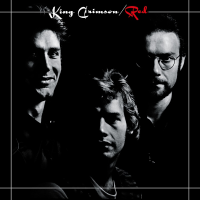
Source:
Glass Onyon PR - Keith James
50th Anniversary editions of King Crimson’s classic 1974 album 4 disc boxed set with 2 x Blu-ray & 2CDs 2 x Blu-rays featuring completely new mixes of the album in Dolby Atmos, 5.1 DTS-HD MA Surround & Hi-Res Stereo by Steven Wilson, New Elemental Mixes in Hi-Res Stereo by David Singleton, a number of extra tracks drawn from the existing sessions reels mixed by David Singleton, all three mixes of the live album USA in Hi-Res Stereo, 5 audio restored ...
read more
King Crimson 'Sheltering Skies' First Release On Vinyl & Standalone CD Of The Complete Concert Available September 6, 2024

Source:
Glass Onyon PR - Keith James
First release on vinyl of a 1980s King Crimson concert First standalone CD release of the complete concert The complete concert from Fréjus, France taken from the original multi-track tapes by Robert Fripp & Brad Davis Additional performance of “The Sheltering Sky" at Cap d’Agde also included Vinyl cut by Jason Mitchell at Loud Mastering Pressed on 200-gram vinyl & presented in a gatefold sleeve CD mastered by Alex R. Mundy at DGM Featuring Robert Fripp: guitar Adrian Belew: guitar, ...
read more
King Crimson 'Larks Tongues In Aspic' The Complete Recording Sessions - Dolby Atmos 2023 Mixes Blu-Ray / 2CD Now Available!

Source:
Glass Onyon PR - Keith James
50th anniversary edition of King Crimson’s classic 1973 album Blu-Ray I features all-new 2023 mixes in Dolby Atmos, DTS-HD MA 5.1 Surround Sound and Hi-Res Stereo by Steven Wilson Blu-Ray I also features the new Elemental Mixes by David Singleton Blu-Ray II contains the complete recordings of every session recorded for the album. All of this material has been newly mixed from the original performances and is presented on disc for the first time in Hi-Res 24/96 stereo. Additionally, Blu-Ray ...
read more
King Crimson’s 'In The Court Of The Crimson King – King Crimson At 50' Documentary By Toby Amies Coming To Select Us Theaters Opening November 3rd!

Source:
Glass Onyon PR - Keith James
Just as King Crimson has been, for more than half a century, an atypical rock band, this film is a refreshingly atypical music documentary. A film about the sacrifices we need to make to bring things of beauty and meaning into the world. But with jokes. Toby Amies’s film In The Court of the Crimson King – King Crimson at 50 provides a unique insight into the working process of a complex touring band, interspersed with contributions from previous band ...
read more
King Crimson's The Elements 2020 Tour Box 2CD Now Available For Pre-Order

Source:
Glass Onyon PR - Keith James
This 2-CD history of King Crimson features many extracts and tracks appearing on CD for the first time, including many of the current line-up. Packaged in a digi-pack style book case with 24-page booklet, this set contains introductory notes by Robert Fripp & sleeve notes by Sid Smith. While this 7th release in the Tour Box series is in spirit with the earlier releases, this is also a very different tour box to its companions, and one which, as it ...
read more
All About Jazz Senior Contributor John Kelman Announces New King Crimson Book

Source:
All About Jazz
All About Jazz Senior Contributor John Kelman is pleased to announce, after nearly fifteen years associated with the website, his first book, currently in progress and expected to be released sometime next year by Panegyric Publishing. The book revolves around his vast amount of writing about King Crimson, one of the founding fathers of progressive rock though, 50 years on, the group prefers not to be saddled with what has become a reductionist term. The book will repurpose his AAJ ...
read more
King Crimson Shades Spotify With Apple Music Exclusive

Source:
HypeBot
King Crimson, one of the last major streaming holdouts, has finally made its entire catalog available. In an apparent dis to market leader Spotify, the classic rockers has made all 13 albums available only on Apple Music. Spotify will reportedly get the catalog next month. From Wikipedia King Crimson is an English progressive rock band formed in London in 1968. King Crimson have been influential both on the early 1970s progressive rock movement and numerous contemporary artists. The band has undergone numerous formations throughout its ...
read more
King Crimson To Release Meltdown In Mexico – Live In Mexico City 2017

Source:
Glass Onyon PR - Keith James
This 3-CD/1-Blu-Ray set features over three and a half hours of material performed during King Crimson's five night residency at Teatro Metropolitan, Mexico City in July 2017 plus audio extras. The Blu-Ray contains over two hours of multi-camera HD recorded footage, audio soundtrack in 24/48 LPCM, hi-res stereo and 5.1 DTS HD-MA (with 'picture off' mode allowing the music to be heard independently in lossless audio). Meltdown in Mexico includes, for the first time with this line-up, audio recordings of ...
read more
King Crimson The Elements Tour Box 2018 2-CD Set Now Available
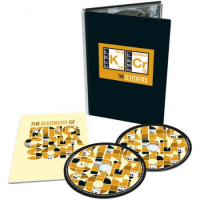
Source:
Glass Onyon PR - Keith James
The Elements Tour Box was originally devised specifically as a one-off edition for the 2014 King Crimson tour but has since become an in-demand series with subsequent editions in 2015, 16 & 17 becoming firm sellers. As with previous releases in the series, the full variety of King Crimson’s music can be represented over 2CDs with extracts from rehearsals, new live recordings, elements from studio recordings, full tracks, alternate takes & finished recordings from 1969-2017, many of which make their ...
read more
King Crimson Releases "Official Bootleg: Live In Chicago, June 28th, 2017" & "Sailors’ Tales (1970-1972)"

Source:
Glass Onyon PR - Keith James
King Crimson's Official Bootleg: Live in Chicago, June 28th, 2017, a two CD set, taken from the band's most recent US tour, was released today (October 13, 2017). Presented as a King Crimson Collectors' Club special edition, King Crimson's Live in Chicago is packaged in a media-book style hard cover 2CD edition with a 24 pages booklet featuring photographs by Tony Levin, introductory notes by Robert Fripp and photos/production notes by KC producer/manager David Singleton. The album showcases many iconic ...
read more




